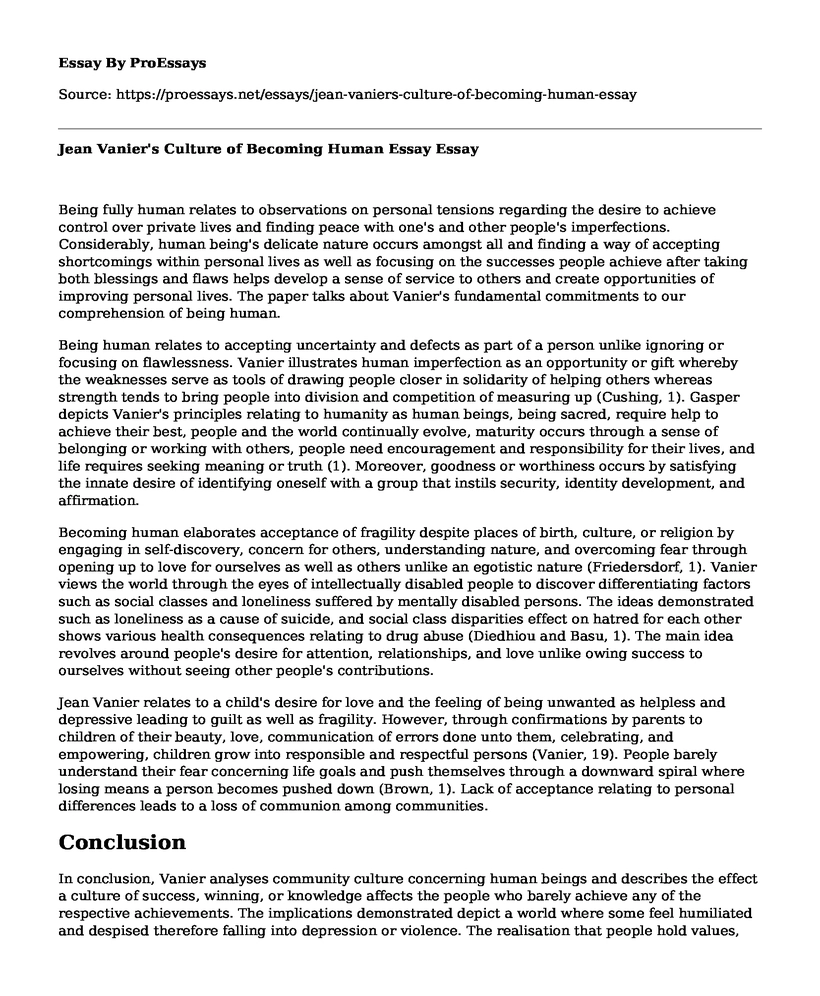Being fully human relates to observations on personal tensions regarding the desire to achieve control over private lives and finding peace with one's and other people's imperfections. Considerably, human being's delicate nature occurs amongst all and finding a way of accepting shortcomings within personal lives as well as focusing on the successes people achieve after taking both blessings and flaws helps develop a sense of service to others and create opportunities of improving personal lives. The paper talks about Vanier's fundamental commitments to our comprehension of being human.
Being human relates to accepting uncertainty and defects as part of a person unlike ignoring or focusing on flawlessness. Vanier illustrates human imperfection as an opportunity or gift whereby the weaknesses serve as tools of drawing people closer in solidarity of helping others whereas strength tends to bring people into division and competition of measuring up (Cushing, 1). Gasper depicts Vanier's principles relating to humanity as human beings, being sacred, require help to achieve their best, people and the world continually evolve, maturity occurs through a sense of belonging or working with others, people need encouragement and responsibility for their lives, and life requires seeking meaning or truth (1). Moreover, goodness or worthiness occurs by satisfying the innate desire of identifying oneself with a group that instils security, identity development, and affirmation.
Becoming human elaborates acceptance of fragility despite places of birth, culture, or religion by engaging in self-discovery, concern for others, understanding nature, and overcoming fear through opening up to love for ourselves as well as others unlike an egotistic nature (Friedersdorf, 1). Vanier views the world through the eyes of intellectually disabled people to discover differentiating factors such as social classes and loneliness suffered by mentally disabled persons. The ideas demonstrated such as loneliness as a cause of suicide, and social class disparities effect on hatred for each other shows various health consequences relating to drug abuse (Diedhiou and Basu, 1). The main idea revolves around people's desire for attention, relationships, and love unlike owing success to ourselves without seeing other people's contributions.
Jean Vanier relates to a child's desire for love and the feeling of being unwanted as helpless and depressive leading to guilt as well as fragility. However, through confirmations by parents to children of their beauty, love, communication of errors done unto them, celebrating, and empowering, children grow into responsible and respectful persons (Vanier, 19). People barely understand their fear concerning life goals and push themselves through a downward spiral where losing means a person becomes pushed down (Brown, 1). Lack of acceptance relating to personal differences leads to a loss of communion among communities.
Conclusion
In conclusion, Vanier analyses community culture concerning human beings and describes the effect a culture of success, winning, or knowledge affects the people who barely achieve any of the respective achievements. The implications demonstrated depict a world where some feel humiliated and despised therefore falling into depression or violence. The realisation that people hold values, desire for relationships, and everyone play as a part of the larger human family create the peace and love needed in the world. Jean Vanier's culture of becoming human successfully portrays the effects of rational coherence without regard for differences in cultural or religious backgrounds as a decisive factor among all persons.
Works cited
Brown, Ian. "Jean Vanier'S Comfort And Joy: 'Find The Places Of Hope'". The Globe And Mail, 2018, https://www.theglobeandmail.com/news/world/jean-vaniers-comfort-and-joy-find-the-places-of-hope/article27842806/. Accessed 30 July 2018.
Cushing, Pamela. "To Be Fully Human". Jean Vanier, 2018, http://www.jean-vanier.org/en/his_message/jean_vanier_on_becoming_human/to_be_fully_human. Accessed 29 July 2018.
Diedhiou, J., Basu, K., S. (2016). ""Becoming Human" Is A Master Piece By Jean Vanier: A Window Of Self-Exploration In Understanding Complex Human Behaviour And Emotions,". Sikkimexpress.Com, 2018, http://www.sikkimexpress.com/NewsDetails?ContentID=9792&SectionID=0. Accessed 29 July 2018.
Friedersdorf, Conor. "'What It Means To Be Fully Human'". The Atlantic, 2018, https://www.theatlantic.com/international/archive/2015/03/what-it-means-to-be-fully-human/387550/. Accessed 29 July 2018.
Gasper, Miss. "Five Principles Of Humanity". Prezi.Com, 2018, https://prezi.com/sz9wcnyjdqw_/five-principles-of-humanity/. Accessed 29 July 2018.
Vanier, Jean. "The Massey Lectures Series". Cdn.Shopify.Com, 2018, https://cdn.shopify.com/s/files/1/0276/4619/t/3/assets/9780887848094_sample.pdf. Pp. 19. Accessed 29 July 2018.
Cite this page
Jean Vanier's Culture of Becoming Human Essay. (2022, Jul 19). Retrieved from https://proessays.net/essays/jean-vaniers-culture-of-becoming-human-essay
If you are the original author of this essay and no longer wish to have it published on the ProEssays website, please click below to request its removal:
- Ethics on the Position Essay Example
- Deliberations on and Suggestions for Revising Canon Four of the Code of Ethics for Engineers
- Relationship Between Depression and Socioeconomic Status Annotated Bibliography
- Warrior Gene: Challenging Our Perception of Violence - Essay Sample
- Unwind: Exploring Different Stress-Relief Practices Around the Globe - Essay Sample
- Essay Sample on Equality: A Controversial Moral Principle in Society
- Human Behavior for Risk Management - Report Example







